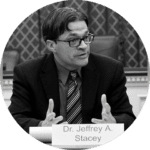Practically the whole roster of Duck bloggers is out at the biggest IR conference of the year–the ISA Conference is in San Francisco this year–leaving this think tank Duck in DC alone and further pondering the divide between the policy and academic worlds. In light of this cri de coeur from a high ranking Navy officer, I had a long conversation this weekend with a former high ranking Army officer who before recently joining the private sector spent two years back in higher education studying classics/philosophy/politics.
In my first and second post after joining this group blog–whose primary aim is to bridge the policy-academic divide–I attempted to highlight how an academic puzzle in search of an explanation is very much tantamount to a policy problem in search of a solution, and then threw out an idea for an Academic Policy Center as a real world device for making this happen. We actually ran this up the pole at the 2010 G8 Summit in Canada, but after the proposal generated ample enthusiasm around the negotiating table, it got lost in the whole mini scandal that upended the summit at the time.
The now private consultant, who spent several tours in Afghanistan prior to her departure, was not wholly optimistic. She concurred that both DOD and the State Department could really use such a Center, but knowing the culture she commented that it would take a philosopher king in order to make it happen. I was forced to concur. We agreed that the best shot we all have of this vast suspension bridge getting built would be, in very practical terms, having a Secretary of State and/or Defense who has a social science PhD and real experience in academia. S/he would also have to be highly motivated to ensure over seveal years time that the products of the Center would get read and acted upon.
Steve Saideman has a banner idea for bridging the divide as well, and the massive opening up of the teaching side of academia bodes well that the same can happen on the publishing side. There would still be the problem of getting overworked policy types to 1) find out about, and 2) actually read the companion blogs to published journal articles. And 3) academics would need to have greater familiarity with the policy sphere to target the blog posts effectively. We could do worse than all being required to know our Aristotle whether we go into government/military service or the academy.
Dr. Jeffrey A. Stacey is currently Managing Partner of Geopolicity USA, an overseas development firm. Formerly he was Senior Fellow at the Center for Transatlantic Relations at SAIS, before which he served in the Obama Administration as a State Department official specializing in NATO and EU relations at the Bureau for Conflict Stabilization Operations. At State he founded and managed the International Stabilization and Peacebuilding Initiative (ISPI), which has over 20 government and international organization partners.
Dr. Stacey is the author of "Integrating Europe" by Oxford University Press and is currently working on a follow-up book entitled "End of the West, Rise of the East?" He has been a guest blogger at The Washington Note and Democracy Arsenal, a professor of U.S. foreign policy at Tulane University and Fordham University, a consultant at the Open Society Institute and the U.S. Institute of Peace, and a visiting scholar at George Washington, Georgetown, and the University of California. He received his PhD from Columbia University.



Although I am a lot more skeptical than you are about this whole gap-bridging exercise, increasing the readership for IR scholarship among those who are not full-time academics is a potential consequence of importing scholarly conversations into a blog format to supplement peer-reviewed published work. Stay tuned.
Ah Patrick, I’m plenty skeptical…we probably need a full blown philosopher king…short of that, your and Dan’s tenure editing the ISQ journal should prove promising…companion blog posts would be a practical improvement
As someone who is preparing to apply to graduate school in the coming year, this topic has popped up on a few blogs here and there. I’m wondering if you guys think that delving into this question could potentially provide material for research and/or a thesis.
I am a grad student myself so take this with a grain of salt…
But it would probably be better to focus on something substantive in International Politics rather than how to bridge the Academic-policymaker divide. Maybe you can find a something where this issue crops up, but it would be better to look at conflict, foreign policy rhetoric, transnational activism, terrorism, etc. than to do a project like that for a dissertation.
@Matt — You might find it amusing or interesting or useful, or all three, to take a look at the back of the current issue of PS: Political Science & Politics, where there is a list of pol sci dissertations completed in the US in 2012, divided by broad subject category. (My favorite was someone at Hopkins who wrote on “Stupidity in Politics.”)
Various factors go into choosing a diss. topic, but prob. above all it shd be something you are enthusiastic about.
I’d be very interested in learning more about what “overworked policy types” did actually read on a day-to-day basis (internal memos? Foreign Affairs? think tank stuff?), it’d then be more strategic for academics to tailor their writing style to their preferences.
Also regarding PTJ’s comments, what are the downsides of IR scholarship being more widely dispersed to non-academics? Will it outweigh the benefits of having more citizens becoming more aware of what academics write about?
I just had an overworked policy type in my office, and so I asked her about bridging the gap. Her response was “market it better”, tell her why it is relevant to her immediate and long term needs, think tweet length summary/relevance and not executive summary length, communicate with her and not at her (understand that they are not academics, and some of them are not even from the discipline).
@Tim – their reading (in my MFA) e-mails…lots and lots of e-mails.
[obligatory: I speak not for my MFA, nor do they speak for me]
Very constructive comments all: Jimmy: right on, but precision tailoring asks a lot of academics, who by nature are not concise and unless they have tenure don’t have time to follow the very latest movements in the policy sphere;
Tim: they are indeed reading very little outside of their emails and shuttling in and out of meetings (they may not even get the Times read on a given day); they would love to have the time to read Foreign Affairs but normally they read only an at-length article or two in a given month;
Matt: MAS makes a good point, you probably want to focus on explaining a real world outcome that is puzzling in some major way (and hopefully an outcome that hasn’t already gained a lot of other attention by other academics yet, so the more recent the better in terms of the odds); but perhaps you could so this topic as a case study in a larger thesis; unless, well, you might have a shot at a theses on the cost in the policy world of not knowing the results of earlier academic research (in my original Duck post I mention a case of this: we in government thought that CERP funding in Iraq was all wrong and needed major reform, reform that was in motion; then I randomly ran into two academics who had a very sophisticated just completed study that showed the where CERP funding was hightest, violence in those spots was lowest–we in government were shocked shocked shocked)
I doubt there is a way for academics to follow “the very latest movements in the policy sphere,” given the amount of effort expended in governments by information providers, e.g. intelligence services, on targeting their own governments. If it is that difficult for people inside the government to target information and analysis for the current decision-making cycle, then I am not sure how efficacious academics can be. It is not simply a matter of packaging, but of being ahead of decisions….as your CERP example shows. If you are not ahead of the decision, then you are delivering something akin to “warning” in the intelligence world, i.e. something unwanted that requires a policymaker to make another decision (action or no action…if yes, then what…?) when they already have a process that think is the best that can be done under the circumstances. Because the decisions on the table or in the process of being made are rarely publicized except on major issues (think Af-Pak review), academics and think tank specialists who do not get phone calls or emails from friends inside the decision-making process are at an extreme disadvantage in terms of getting relevant scholarship in front of policymakers. The implementation phase brings its own set of challenges…
Call me a bit pessimistic, but I think the biggest problem with the “bridging the gap” discussion is not the packaging or the time to read problems. Instead, it is timing the delivery while policymakers are still cognitively open to new information ahead of making a decision.
I would suggest scholars’ time would be better spent on the lower-level staffers, who they are unlikely to acknowledge as peers but are more likely to be asked to write the policy memos. That way, the information may be available inside government and possibly already percolating upward when the time comes. Not that these people aren’t busy, but their time is not scheduled in 15 minutes blocks the way more senior policymakers’ lives are.
Jeffrey Stacey:
Matt: MAS makes a good point, you probably want to focus on explaining a
real world outcome that is puzzling in some major way (and hopefully an
outcome that hasn’t already gained a lot of other attention by other
academics yet, so the more recent the better in terms of the odds)
That’s one kind of diss., certainly not the only possible kind. Matt shd probably take some time to explore the field and see where his interests lie before deciding what kind to do.
[Disclosure: I am arguably/prob. not the best person to be giving advice on such matters, but this is a blog so WTF]
Btw where does J. Stacey get the idea that “the primary aim” of D of Minerva is to bridge the divide betw policy and academic worlds? I’ve been reading this blog for a # of yrs and was under the impression that it did not have a sharply focused ‘primary aim’ or singular mission. [Unlike eg The Monkey Cage, which does pretty much have a singular mission.]
Very good point LProulx, that’s why I too have doubts about either academic articles or blog posts getting read by policy makers, hence my looking for other devices…LFC you have a point as well, it’s normally fairly subtle